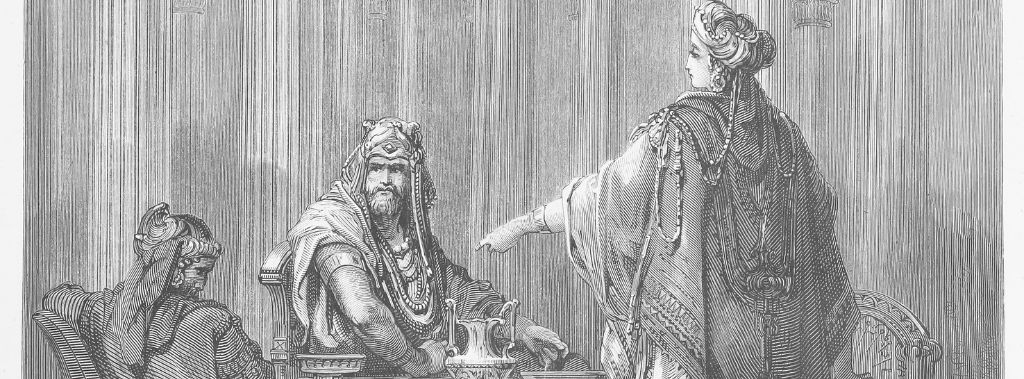Expectation Breakers: Esther/Hadassah
In the Word there are thousands of figures, and of those, hundreds who directly impacted the course of the future for the better in their obedience to God. Among these hundreds stands one woman, Hadassah—also called Esther—who God used to help save an untold number of lives!
Join us as we discover how God raised up an orphaned girl into the expectation breaking woman we know as Queen Esther… and how Believers today can learn from her example: not to follow man’s expectations, but instead, God’s.
Man’s Expectations for Hadassah
Born several generations after God’s chosen had been taken into Babylonian captivity, Hadassah was not likely expected to shape the world in any remarkable way. After all, even with the Jewish people no longer being forcibly detained, a Jew living outside the Promised Land was unlikely to aim for the moon—and less likely to be expected to by those around them.
Yet, being a “stranger” in a strange land was not to be the only thing which lowered the expectations for Hadassah’s future. She was soon to become an orphan, taken in by her cousin, Mordecai. Yes, Mordecai loved her and raised her as a daughter, and she grew to be a great beauty. But she was still a woman, orphaned, and Jewish, living in a non-Jewish land. The expectations of those around her could not have been high, with heights likely reaching a decent marriage to a Jewish businessman. But God had greater expectations for this orphaned girl.
God’s Expectations for Hadassah/Esther
While living in Shushan with her cousin, Mordecai, God began to shape Hadassah’s future into that of an expectation breaker. God crafted her to not only be beautiful, but pleasant, learned, wise, and obedient—especially in those things God deemed right. Further, when the time was right, He allowed the king of Persia to depose his queen, thereby opening a place for Hadassah—soon known as Esther—not only to become queen in a land not fully her own, but to save many of God’s people from death and destruction.
Hadassah, along with what could have been hundreds of other young, beautiful virgin women, were brought to the citadel in Shushan. There, she went by the name Esther, hiding her heritage as Mordecai had instructed her. Yet, even amongst a multitude of other women, God granted her favor…
Hegai—the king’s eunuch, who functioned as custodian of the women—was pleased with Esther, giving her beauty treatments and special privileges beyond those allotted to each potential queen. And as such, Esther trusted Hegai to advise her. So much so, that after a year of preparation, when she was to be brought before the king, she took with her only those things Hegai advised.
In all the phases of her preparation, and with all those who saw her, God granted her favor. Yet, that was only the beginning…
Becoming Queen Esther
Due to her obedience to those God had put in place to guide her—Mordecai and Hegai—Esther found extreme favor with the king. Esther 2:17-18 says, “The king loved Esther more than all the other women, and she obtained grace and favor in his sight more than all the virgins; so he set the royal crown upon her head and made her queen… Then… made a great feast, the Feast of Esther… and he proclaimed a holiday… and gave gifts according to the generosity of a king.”
Esther was given great favor by God, going from an orphaned girl in a “foreign” land to its queen… yet God was not done!
Mordecai, through God’s prompting to continually seek out his Hadassah’s well-being, learned of a plot to murder the king and was able to inform the now, Queen Esther, setting future events into motion. Esther was able to bring the issue to light and see her king safe, while simultaneously creating a history of loyalty, not only for Mordecai, but herself as well. However, things would not remain blissful for long, and Esther would have to rely upon God’s strength to continue to be the expectation breaker He created her to be…
Haman, a wicked man, advanced beyond all the king’s princes, decided to set in motion an evil plan. His vanity wounded when Mordecai refused to bow to him, Haman’s festering dislike of Mordecai quickly turned into a dark obsession. So dark in fact, that instead of merely taking revenge on Mordecai, he decided to destroy ALL Jews within the kingdom!
By casting lots, Haman determined the time for the Jews’ destruction. Then, after having his plan and timeframe firmly in place, he went to “warn” the king of the troublemakers…
Presenting them as both insignificant in number and a threat—while avoiding any mention of who they were, Jews—Haman, only recently appointed to his position of power, was given the king’s signet ring to do as he pleased with these people. The king put his trust in a wicked man, thinking the actions of Haman would protect and not hurt his kingdom. Yet, what the enemy meant for evil the Lord used for good…
A Call for “Such a Time as This”
When the wicked plan of Haman became known to Mordecai, he wept, putting on sackcloth and ashes before making his way, wailing and crying, as near to the king’s gate as he could. Mordecai, though lost in grief, was led by God to a place where Queen Esther was bound to hear the commotion. And hear she did.
Not knowing of the edict of destruction, Esther attempted to send Mordecai garments to replace his sackcloth and ashes, only to have him refuse. So, upon the clothes being returned to her, she sent one of her eunuchs to whom Mordechai related the woe and gave a copy of the edict… which was quickly passed to Esther. And it is at this point when Esther’s biggest role as an expectation breaker came to light.
“…Yet who knows whether you have come to the kingdom for such a time as this?”
—Esther 4:14
Esther would, after three days of fasting and prayer, go before the king—even though she had not been called for in thirty days…
This decision, in modern times, hardly appears “expectation-breaker” worthy… but her life was on the line. She would face certain death if the king did not hold out his golden scepter to her.
The king had not called for her… it had been far too long for her to have any hope of surviving. She herself said, “if I perish, I perish” (see Esther 4:16). Having lived in the king’s palace for years, having experienced the distancing between herself and the king, Esther knew better than anyone her low odds.
Still, Esther went before him. She, with only three days of fasting and prayer to bolster her faith, walked into what could easily be death. Yet, because God was with her, the king held out his golden scepter.
Esther found favor, and she invited the king and Haman to dine with her, then again, for a second night, before she would finally make her request and petition known. Yet, in the single night between Esther’s banquets, spiritual forces warred…
Haman’s hatred of Mordecai, combined with evil advice from his wife and friends, caused him to order a seventy-five-foot-tall gallows built on his property. Meanwhile, the Lord was at work in the king, providing him a sleepless night so that the chronicles would be brought, and with it, remembrance of how Mordecai had saved his life.
In the morning, Haman went to the king to arrange for Mordecai’s death on his gallows. Only, the king had a hugely different plan in mind—not of death, but honor. An honor which caused Haman to suffer great humiliation, due to his pride…
For Haman was to lead Mordecai throughout the city, honoring the man he loathed instead of hanging him. Yet, this was not to be the last of Haman’s woes…

At Esther’s second and final banquet, she made her request and petition known the king. She brought the king’s wrath down upon Haman by her words. And upon hearing from a eunuch that Haman had made a gallows for Mordecai—the very man who was honored hours prior—the king ordered Haman hung upon it instead.
Still, anything sent out with the king’s signet could not be undone. The plot devised by Haman would succeed if Queen Esther and Mordecai—who now possessed the king’s signet ring—could not discover a loophole… but God showed them a way.
The Hand of God Both Then and Now
Queen Esther and Mordecai put forth an edict allowing the Jews in all the king’s provinces to gather and defend themselves against attackers. Further, a second edict was put forth allowing a second day for the Jews in Shushan to fight any who oppressed them. Each of these edicts saving incredible numbers of Jewish lives.
Then, the orphan made queen, in conjunction with Mordecai, created the holiday known as Purim, where the Jewish people—and those grafted-in—might celebrate God’s mighty hand!
And so, Esther’s legacy as a woman of God AND an expectation breaker, was secured…
Yet, more than even Esther’s incredible actions are those of God, who had led her through every hurdle and who displayed His hand so wonderfully. It is therefore God who deserves the glory for opening doors, closing others, and leading Esther on an incredible journey!
We can come away with many lessons from the book of Esther—from Esther’s journey and how God moved in and through her. And one of the lessons is this… that no matter where we have been, or what we have or have not done, God can use us. Because God does not call the qualified, He qualifies the called. For God He sees beyond earthly titles, such as that of “orphan,” to see our true identity in Him!
Each of us is able to become an expectation breaker. This can appear different for each of us, but in our obedience to God, our love of Him and His people, and our willingness to seek God and His Kingdom first… we open ourselves to be vessels of blessing and change! When the “orphans” of this world discover their heritage in God, chains, false identities, and false expectations are BROKEN!
